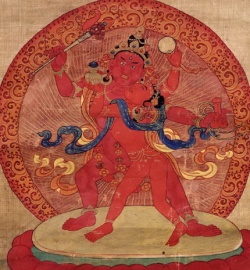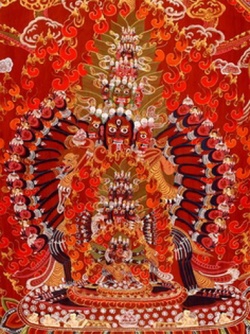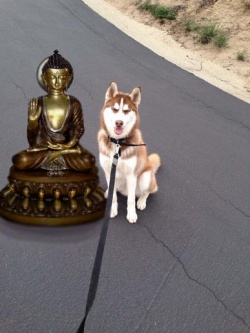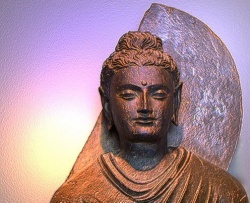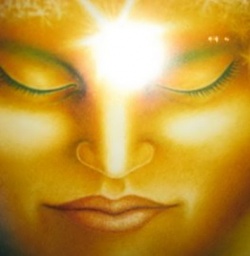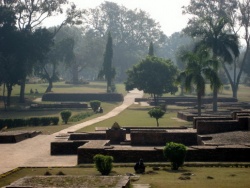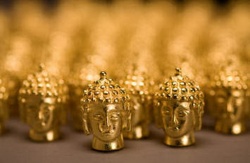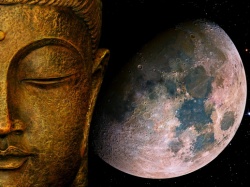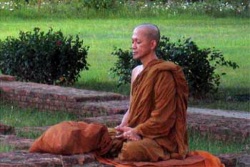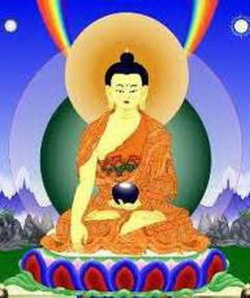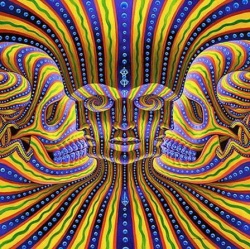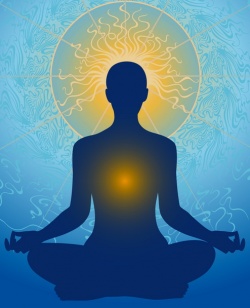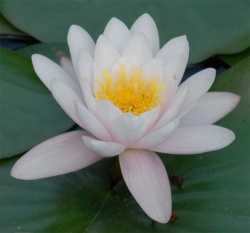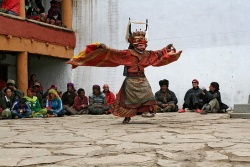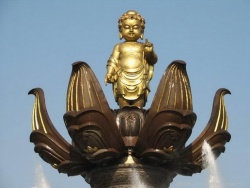Nirvana Sutra: Chapter Twenty-One: On Pure Actions-1
Mahayana Mahaparinirvana Sutra
Translated by KOSHO YAMAMOTO
FROM Dharmakshema's Chinese version
The World's genuinely first-ever web edition of this complete scripture
(This "Yamamoto/page edition" is Copyright of Dr. Tony Page, 2004 )
The Complete Kosho Yamamoto English Translation of the "Nirvana Sutra", edited and revised by Dr. Tony Page, typographically improved by Jay and Gabriele Mazo
Chapter Twenty-One: On Pure Actions-1
"O good man! What are the pure actions of a Bodhisattva-mahasattva? O good man! The Bodhisattva-mahasattva, abiding in the Mahayana Mahaparinirvana, can be perfect in pure actions in seven categories. What are those seven? They are: 1) knowing Dharma, 2) knowing the meaning, 3) knowing the time, 4) being contented, 5) knowing for oneself, 6) knowing the masses, 7) knowing the difference between respectable and mean.
"O good man! How does a Bodhisattva-mahasattva know Dharma? O good man! This Bodhisattva-mahasattva knows the twelve types of scripture, which are:
- 1) sutra,
- 2) geya,
- 3) vyakarana,
- 4) gatha,
- 5) udana,
- 6) nidana,
- 7) avadana,
- 8) itivrttaka,
- 9) jataka,
- 10) vaipulya,
- 11) adbhutadharma,
- 12) upadesa
"O good man! What is meant by "sutra?" A sutra begins with: "Thus have I heard" and ends with: "practise with joy". All such are "sutras".
"What is "geya?" It goes like this: "The Buddha said to all bhiksus: In days gone by, I, like you, was ignorant and had no Wisdom, and could not see the Four Truths. For that reason, I had long transmigrated and repeated birth and death and floundered in the great sea of suffering. What are the Four? They are: 1) Suffering, 2) the Cause of Suffering, 3) Extinction, 4) the Way to the Extinction of Suffering. In days gone by, the Buddha spoke of the sutras. At that time, there was a sharp-witted person who came to the Buddha to be taught Dharma. He asked others: "What did the Tathagata speak about before?" The Tathagata, seeing this, said in a gatha, basing himself on the sutras:
"I, like you, did not see the Four Truths
And as a result floundered long in the sea
Of suffering of birth and death.
By seeing the Four Truths,
One well severs birth and death.
Birth and death done away with,
One no more gains any existence."
This is "geya."
"What is "vyakarana"? There are sutras and vinayas (monastic rules) in which, when the Tathagata speaks, he gives prophecies to all the heavenly ones, such as: "O you, Ajita! In days to come, there will be a king named "Sankha". In his reign, you will practise the Way, attain Buddhahood, and be called Maitreya." This is "vyakarana".
"What is "gatha"? In addition to the sutras and vinaya, there are cases in which a four-line poem appears, such as:
"Do not do any evil;
Do all that is good.
This is the teaching of all Buddhas."
This is "gatha"?
"What is "udana"? The Buddha, at about four in the afternoon, enters a dhyana (meditation). He speaks about Dharma to the devas (gods). At that time, the bhiksus (monks) think: "What is the Tathagata doing?" The Tathagata awakes next morning from the dhyana and, without being asked by anyone, he, with the power of knowledge that can read the minds of others, speaks unasked: "O Bhiksus! Know that the life of all devas is extremely long. O all of you Bhiksus! It is good that you all act for others and do not seek your own profit. It is good that you seek but little; it is good that you feel contented; it is good that you are quiet (peaceful)!" It goes like that. In all such scriptures, the Buddha speaks unasked. This is "udana".
"What is "nidana"? The gathas of all sutras speak for others about the basic roots of all causes. In Sravasti there was a man who caught a bird in a net. Having caught it, he put it in a cage, gave it water and cereal, and then let it go. The World-Honoured One knows all histories from beginning to end and talks about this in a gatha, such as:
"Do not belittle small evil acts,
And do not say that there is no evil that arises.
Small is a drop of water,
But (by accumulation) it fills a great vessel."
This is "nidana".
"What is "avadana"? It is as in the case of the parables that occur in the vinaya. This is "avadana".
"What is "itivrttaka"? This is as when the Buddha says: "O Bhiksus! Know that what I speak when I am in the world is the sutras. In the days of Buddha Krakucchanda, it is called "amrta-drum" (drum of the Immortal); what appears in the days of Kanakamuni is called "Dharma-mirror"; what appears in the days of Buddha Kasyapa is called "Void-discriminating". This is "itivrttaka".
"What is "jataka"? This is when the World-Honoured One (tells of how he), in days gone by, became a Bodhisattva and practised the Way, such as: "O Bhisksus! Know that, in days gone by, I gained life as a deer, a brown bear, a reindeer, a hare, the king of a small state, a chakravartin, a naga, and a garuda. Such are all the bodies one receives when one practises the Way of a Bodhisattva." This is "jataka".
"What is "vaipulya sutra"? It is none other than the Mahayana vaipulya (extensive) sutras. What it states is on a large scale. It is like space. This is "vaipulya".
"What is "adbhutadharma"? After the Bodhisattva has just been born, he takes seven steps without any help from others, sending out great lights, which shine in all ten directions; or a monkey holds in its hand a pot of honey and offers it to the Tathagata; or a white-headed dog sits by the Buddha's side and listens to his sermons; Marapapiyans transforms himself into a blue cow and walks between tiles and bowls, touching but not damaging them; or, when the Buddha first enters the devas' temple, the devas come down and pay him homage. Any sutra such as this is called "adbhutadharma".
"What do we mean by "upadesa"? It is one (scripture) that discusses the sutras which contain the Buddha's sermons and analyses and widely explains the characteristics. Any such is an "upadesa".
"If any Bodhisattva is well versed in the twelve types of scripture, this is "knowing Dharma".
"How does a Bodhisattva-mahasattva understand the meaning? A Bodhisattva knows the meaning of all words and languages. This is knowing the meaning.
"How does a Bodhisattva-mahasattva know the (right) time? O good man! The Bodhisattva, at a given time, will practise quietude. At another time, he will make effort. At another time, he will practise equanimity and dhyana. At another time, he will make offerings to his teacher. At another time, he will practise dana (giving), upholding the moral precepts, forbearance, effort, and dhyana, thus perfecting prajnaparamita (transcendent Wisdom). This is knowing the time.
"In what way does a Bodhisattva-mahasattva feel contented? O good man! The Bodhisattva-mahasattva knows contentment in his meals, clothing, medicine, in going, coming, sitting, lying, sleeping, waking, talking and in silence. This is knowing contentment.
"O good man! How does a Bodhisattva-mahasattva know things by himself? The Bodhisattva knows all about faith, the precepts, rich hearing, equanimity, Wisdom, going and coming, right remembrance, good deeds, questions and answers. This is knowing of one's own self.
"How does a Bodhisattva-mahasattva know the masses? Such a Bodhisattva knows: "This is a Kshatriya, this a Brahmin, this an upasaka, this a sramana. Such a person goes thus, comes thus, sits thus, stands up thus, delivers sermons thus, and puts questions and answers thus." This is knowing the masses.
"O good man! In what way does a Bodhisattva-mahasattva know the difference between "respectable" and "mean"? O good man! There are two kinds of men: one who has faith, and the other, who has not. O Bodhisattva! Know that he with faith is one who is good, and that he who has no faith is one who is not good. Also, next, there are two kinds of faithful person. One always pays visits to viharas, and the other does not. O Bodhisattva! Know that he who goes is good, and the other who does not should not be called good. There are two kinds of people who go to viharas. One is he who worships, and the other is he who does not. O Bodhisattva! Know that he who worships is good, and the other who does not is not to be called good. There are two kinds of worshipper. One is he who listens to the sermons, and the other is he who does not listen to the sermons. O Bodhisattva! Know that he who listens to the sermons is one who is good, and that the other is one who cannot be called good. There are again two kinds of people who listen to sermons. The one is he who listens with a true mind, and the other is he who has no true mind. O Bodhisattva! Know that he who listens with a true mind is one who is good, and that he with no true mind is not to be called good. Of listeners with a true mind, there are two kinds. One thinks about the meaning, and the other does not think about the meaning. O Bodhisattva! Know that he who thinks about the meaning is good, and he who does not think about the meaning is not good. And there are two kinds amongst those who think about the meaning. One is he who practises the Way as told, and the other is he who does not practise the Way as told. He who practises the Way as told is one who is good, and he who does not practise the Way as told is one who is not good. There are, again, two kinds of people who practise the Way as told. One is he who takes to the Way of the sravaka, who is unable to releave all beings of all their worries and give them peace and benefit; the second is he who takes to the unsurpassed Mahayana and gives benefit and peace to the many. O Bodhisattva! Know that he who gives benefit and peace to the many is unsurpassed and the best.
"O good man! Of all jewels, the cintamani (wish-fulfilling gem) is the most superb; of all tastes, amrta (ambrosia) is the best. Such a Bodhisattva is the most superb and the best of all humans and devas. No comparison can express it. O good man! This is what we mean when we say that the Bodhisattva-mahasattva abides in the Mahayana Great Nirvana Sutra and lives in the seven good laws. The Bodhisattva, abiding in these seven good laws, can become perfect in pure action.
"Also, next, O good man! There are pure actions, which are: loving-kindness (“maitri”), compassion (“karuna”), sympathetic joy (“mudita”), and equanimity (“upeksha”)."
Bodhisattva Kasyapa said to the Buddha: "A person who practises kindness segregates himself from anger; a person who practises compassion segregates himself from anger. And yet we speak of the "limitless (immeasurable) minds". From the content of the meaning, there must be three. O World-Honoured One! There are three circumstantial factors in loving-kindness. One relates to beings, the second to dharmas, and the third to what is unrelated. The same with compassion, sympathetic joy, and equanimity. Following this logic, there can only be one, not four. What relates to beings comes about relative to the five skandhas, and one prays to give bliss thereto. This is what relates to beings. By what relates to things (dharmas) is meant giving what beings desire to possess. This is what relates to things. By "unrelated" comes about (is meant) the Tathagata. This is the "unrelated". Compassion has bearings on the poor and those in stressed circumstances. The Tathagata, the great teacher, is long since far removed from poverty and stressed circumstances and is blessed with the highest bliss. If any relation is had with beings, it obtains thus with the Buddha. The same is the case with things. That is why we say that any bearing that is had upon the Tathagata is the "relationless". O World-Honoured One! The field in which compassion becomes related to all beings has bearings upon parents, wife, children and relatives. Hence, we say "related to all beings." We say "related to dharmas". Here, we see no parents, wife, children or relatives. We see here that all things arise from circumstantial factors. Hence, "related to dharmas". The "unrelated" is not based on dharmas or beings. Hence, "unrelated". It is the same with compassion, sympathetic joy, and equanimity. So there must be three things, and not four. O World-Honoured One! There are two kinds of people. One is a person who practises the Way using his own intellect, and the other is a person who practises the Way through faith and love. The person who practises the Way through the intellectual channel generally practises loving-kindness, and the person who practises the Way through faith and love practises sympathetic joy and equanimity. Hence, there must be two, and not four. O World-Honoured One! "Immeasurable" means "boundless". The boundary is unattainable. Hence, "boundless". If (something is) "immeasurable", there can only be one, not four. If there were four, how could they be immeasurable? Therefore, there must be one, not four."
The Buddha said to Kasyapa: "O good man! The essence of what the All-Buddha-Tathagata says is undisclosed. For this reason, it is difficult to know. There are cases where he speaks about a set of causes and conditions. What there is (here) is just one. It is as when one says that all things are created things. Or there may be a case where it is said that there are two kinds. These are the direct and indirect causes, and the result. Or it may be spoken of as three. These are illusion, action and suffering. Or it may be spoken of as four. These are ignorance, created existence, birth, and age-and-death. Or it may be spoken of as five, such as: feeling, craving, cleaving, existence, and birth. Or it may be spoken of as six, which are the causes and results of the Three Times (past, present and future). Or things may be spoken of in terms of seven, which are consciousness, mind-and-body, the six sphere, touch, feeling, craving, and cleaving. Or one might speak of eight things, which are those (of the twelve links of interdependent arising), minus the four elements of ignorance, action, birth, and age-and-death, which makes eight. Or one may speak of nine, as stated in the “Nagara Sutra”. This refers to the nine, excepting the three elements of ignorance, action, and consciousness. Or one may speak of eleven, as to Satyakanirgranthaputra. These are the eleven, excepting the one category of "birth". At times, the Buddha speaks fully of the twelve links of interdependent arising. This is as when he spoke at Rajagriha to Kasyapa and others about ignorance all the way down to birth, age, illness, and death. O good man! A single causal relation is, for the benefit of beings, expounded in various ways. It is the same with the innumerable phases (aspects) of the mind. O good man! For this reason, do not entertain doubt in regard to the deeply-hidden action of the All-Buddha-Tathagata."
"O good man! The Tathagata-World-Honoured One enacts great expedients. He speaks of impermanence as Eternal, and of the Eternal as impermanent. He speaks of Bliss as suffering and suffering as Bliss; the impure as Pure and the Pure as impure. He speaks of the Self as selfless and of the selfless as the Self; of non-being as a beings and the real being as a non-being. A non-substance is spoken of as a substance and a substance as a non-substance. The non-real is spoken of as real and the real as non-real; the non-field of cognition as a field of cognition and the field of cognition as a non-field of cognition; non-birth as birth and birth as non-birth; ignorance as brightness and brightness as ignorance; rupa (form) as non-rupa and non-rupa as rupa; the non-Way as the Way and the Way as non-Way. O good man! The Tathagata, by using all such expedients, sets beings to rights. How could we say that anything is wrong with him?
"O good man! There may be a person who covets wealth. I then, for the sake of that person, transform myself into a chakravartin and for innumerable ages give things to him in various ways. Later, I teach him and enable him to abide in unsurpassed Enlightenment. If there is a person who clings to the five deisres, I fill up that person's clinging for innumerable ages with wonderful things that such a person desires to have, and later teach him and make him attain unsurpassed Enlightenment. If there is a rich person, strong and proud, I serve him for innumerable hundreds of thousands of years, running errands and waiting upon him, and after having won over such a person's mind, I will cause him to attain unsurpasssed Enlightenment. If there is a person who transgresses, is self-assertive, thinks he is on the right path and quarrels with others, I shall, for innumerable ages, advise him, remonstrate with him and bring him round, and then cause him to attain unsurpassed Enlightenment. O good man! The Tathagata, for innumerable ages, enacts various means, thus causing beings to achieve unsurpassed Enlightenment. How could anything be wrong here? The All-Buddha-Tathagata may live amidst all evils, but, like the lotus, he is not tainted (by them). O good man! You should understand the four immeasurables (i.e.” Brahma-viharas”) thus.
"O good man! There are four qualities in this limitless mind. The practice accomplished, one gains birth in the world of Great Brahma. O good man! There are thus four kinds within the limitless mind. That is why we speak of four. By practising loving-kindness (“maitri”), a person thoroughly extirpates greed. Practising compassion (“karuna”), a person extirpates anger. Practising sympathetic joy (“mudita”), a person extirpates non-bliss. By practising equanimity, a person well segregates beings from greed and anger. O good man! For this reason, we speak of four. It is not one, not two, and not three.
"O good man! As you say, loving-kindness indeed cuts out anger. If things are thus with compassion, one may say three. Do mot make such a reproof. Why not?
"O good man! Of anger, there are two kinds. One takes life; the other encourages a person. O good man! Because of this, how could it be other than four?
"Also, next, of anger there are two kinds. One is being angry towards beings, and the other towards non-beings. By practising loving-kindness, one thoroughly dispels anger towards beings; by practising compassion, one thoroughly dispels anger towards non-beings.
"Also, next, of anger, there are two kinds. One is based on causal relations and the other is not. Practising loving-kindness, one cuts away that which is based on causal relations; practising compassion, one cuts away that which is based on causal relations.
"Also, next, there are two kinds of anger. One is anger that has been accumulated over a long period in the past, and the other is that which one has just gained. By practising loving-kindness, one severs the anger from the past, and by practising compassion, one severs the anger of the present.
"Also, next, there are two kinds of anger. One is anger at holy persons, and the other at common mortals. By practising loving-kindness, one casts off anger at holy persons; by practising compassion, one casts off anger at common mortals.
"Also, next, there are two types of anger. One is top-grade, and the other is middle-grade. The practising of loving-kindness dispels top-grade anger, while practising compassion dispels middle-grade anger. O good man! For this reason, I say four. How can you reproach me and speak of three and not four? Thus, O Kasyapa, in this limitless mind, antitheses stand against one another, and classified, we get four.
"Also, it is four because of the vessel. If there is loving-kindness in the vessel, there can be no compassion, joy, and equanimity. For this reason, it is four and nothing less.
"O good man! We discriminate according to action. Hence, four. When loving-kindness is acted upon, there can be no compassion, sympathetic joy and equanimity. Hence, four. O good man! Because of limitlessness, we say four. Now, of the limitless there are four kinds. There is the case where what there is is the relation of the limitless mind, but not unmolestedness (unimpededness). Or there is the case where the limitless mind is unmolested and it does not stand (depend) upon relations; there is the case where things stand on the relations of the limitless mind and also on unmolestedness; there is the case where things do not stand on relations and also not on unmolestedness. What is the limitless that has relations, but is not unmolested? This is the case where causal relations are had with innumerable and boundless beings, and yet there is nothing of the kind as the unmolested state of samadhi. Even if gained, it does not remain. Or one gains and loses it. What is the limitless that is unmolested and has no causal relations? It is like desiring to have causal relations with parents, brothers and sisters and to give them peace and bliss. There can be no limitless causal relations (here). What is the limitless that has causal relations and is unmolested? This refers to all Buddhas and Bodhisattvas. What is the limitless with no causal relations and no unmolestedness? The sravakas and pratyekabuddhas cannot have unlimited relations with beings. Also, they are not unmolested (i.e. they are constrained by limitations). O good man! Because of this, we speak of the "four limitlessnesses". This is not something any sravakas or pratyekabuddhas can know. This is what applies to the world of the All-Buddha-Tathagata. O good man! The sravakas and pratyekabuddhas may call these four the things that are limitless. But petty is what is said (by them); it is not worth talking of. All Buddhas and Bodhisattvas should be called the "limitless limitless."
Bodhisattva Kasyapa said to the Buddha: "O World-Honoured One! It is thus, it is thus! It is just as you, the Holy One, say. What obtains in the world of the All-Buddha-Tathagata does not come within the reach of sravakas and pratyekabuddhas. O World-Honoured One! A Bodhisattva abides in the Mahayana Mahaparinirvana and gains a heart of loving-kindness. Is this a great heart of loving-kindness and compassion or not?" The Buddha said: "It is! O good man! The Bodhisattva sees three things as he lives with all beings, which are: 1) people on intimate relations (with him), 2) people of hateful relations, and 3) people who are in between. With those on intimate relations, there are three classes, which are: 1) top, 2) middle, and 3) low. The same with those involved in hateful relations. This Bodhisattva-mahasattva gives the highest bliss to those with whom he is on the most intimate relations. He also gives the highest bliss all-equally to those of the middle and low grades. He gives some degree of bliss to those whom he hates most, and to a person whose hatred is of middle grade he gives middle-grade bliss, and to him whose hatred is of a low level, he gives the highest bliss. The Bodhisattva thus practises from one to the other, and to the one he most hates he gives middle-grade bliss and to those whom he hates on a middling level and a low level, he gives the highest bliss. He practises and gives the highest bliss all-equally to those of the top, middle and low grades. When the highest bliss is given to one whom he most hates, we say that the heart of loving-kindness has been accomplished. The Bodhisattva, then, whether at the place of his parents or of those whom he most hates, is all-equal in mind, and there exists no mental state of discrimination. O good man! One obtains loving-kindness, but this is not called great loving-kindness."
"O World-Honoured One! Why is it that the Bodhisattva achieves such loving-kindness and yet we do not call it great loving-kindness?" "O good man! We do not call loving-kindness great loving-kindness, because it (great loving-kindness) is hard to obtain. Why so? For a long time past, over innumerable kalpas, one has amassed “asravas” (defilements, illusions) and not practised what is good. For this reason, one is unable to subdue the mind in a day. O good man! When a pea is dried up, one might try to thrust an awl through it, but one cannot. It is like that. The “asravas” are as hard as that. Try as one might single-mindedly the whole day and night through, one cannot yet subdue them. Also, the dog of a house does not fear people, and the deer of the forest fears man and runs away. Anger is difficult to do away with, like the dog that guards a house; but the heart of loving-kindness easily flees, like the deer in the forest. It is therefore hard to subdue this mind. That is why we do not say "great loving-kindness". Also, next, O good man! When we draw a picture on stone, it always remains thus. But drawn on water, it disappears immediately and its strength does not remain there. Anger is hard to do away with, like a drawing that has been done in stone. A good deed easily disappears, like a picture drawn in water. That is why it is not easy to subdue this mind. A great ball of fire sustains light for a long while; the brightness of a flash of lightning cannot endure long. It is the same here. Anger is a fire-ball; loving-kindness is like lightning. That is why this mind is hard to subdue. Hence, we do not say "great loving-kindness".
"O good man! When a Bodhisattva-mahasattva attains the first soil (“bhumi” - level of a higher Bodhisattva), this is called "great loving-kindness". Why? O good man! The last (i.e. most) evil person is the icchantika. When a Bodhisattva of the first “bhumi” practises great loving-kindness, no discrimination exists in his mind - not even towards an icchantika. As no wrong is seen, no anger arises. For this reason, we indeed call this "great loving-kindness". O good man! He deprives all beings of what gives no benefit. This is great loving-kindness. He desires to give an uncountable amount of benefit and bliss to all beings. This is great compassion. He plants joy in the minds of all beings. This is great sympathetic joy. There is no guarding or protecting. This is great equanimity (“upeksha”). My Dharma does not see one's own existence and self; what is seen is that all things are viewed all-equally and with no divided mind. This is great equanimity. One forsakes one's own bliss and gives it to others. This is great equanimity (or: great relinquishment).
"O good man! The only thing there is here is that these four limitless minds well enable the Bodhisattva to increase and perfect the six paramitas (perfections). Things are not necessarily thus regarding others' actions. O good man! The Bodhisattva-mahasattva first gains the four limitless minds that pertain to the world. Later, he aspires to unsurpassed Bodhichitta (resolve to win Enlightenment). And by degrees he gains what concerns those of the supramundane world. O good man! From the limitedness of the secular world, one obtains the unlimitedness of the supramundane world. Hence, we say "great limitlessness."
Bodhisattva Kasyapa said to the Buddha: "O World-Honoured One! We say that the benefitless is done away with and that benefit and bliss are given. Truth to tell, nothing happens. Thinking thus is surely false. No real fruition comes about. O World-Honoured One! This is as when a bhiksu meditates on impurity and regards what he is wearing as leather, which it actually is not. He thinks that what he eats is worms. But here too, it is not really worms. He regards a beautiful soup as a defiled liquid, but it is not really anything defiled. He regards the cream that he eats as the marrow of the brain, but actually it is not a brain. He meditates on the crushed powder of bones and regards it as parched barley flour. And yet it is not really parched barley flour. The same with the case of the four limitless minds. There is not really any benefiting of beings, nor any giving to them of bliss. The mouth speaks about bliss being given. But no such thing comes about. It such a meditation not false? O World-Honoured One! If it is the case that falsehood does not exist here, but bliss (truly) is given, why is it that all beings do not gain bliss by the miraculous powers of all Buddhas and Bodhisattvas? If no bliss results in any true sense, it must be as the Buddha says: "I call to mind that in days gone by I practised loving-kindness and through seven successive stages of the dissolution and re-arising of the world in this kalpa aeon, I did not get born here. When the world was born, I saw my birth in the heaven of Brahma, and when the world underwent dissolution, I was born in the heaven of Abhasvara. Born in the heaven of Brahma, one has unmolested (i.e. unrestricted) power and cannot ever be subdued. Of the thousand Brahmas, the most superb is Great Brahma. All beings considered me as the most superb. Thirty-six times I became Sakrodevanamindra, the King of Trayastrimsa Heaven, and innumerable hundreds of thousands of times a chakravartin. Only by practising the Way of the heart of loving-kindness did I gain the fruits of man and heaven." If not true, how could things be in accord with this meaning?"
The Buddha said: Well said, well said, O good man! You are, indeed, brave and fear nothing." And for Kasyapa's sake, he spoke in a gatha:
Even towards a single being
And prays to give bliss to such a being,
This is loving-kindness.
If one has compassion
For all beings,
This is the holy seed.
Endless is the recompense.
Even if the five-powered rishis filled this earth
And gave to Mahesvara elephants, horses
And their various possessions,
The reward gained would not equal
One sixteenth of one (impulse of) loving-kindness
That is practised."
"O good man! Practising loving-kindness is true and does not come from a false mind. It is clearly the truth. The loving-kindness of sravakas and pratyekabuddhas is that which is false. With all Buddhas and Bodhisattvas, what there is (there) is the true, and not what is false. How do we know this? O good man! As the Bodhisattva-mahasattva practises the Way of Great Nirvana, he meditates upon earth and (mentally) turns it into gold, and meditates upon gold and turns it into earth, earth into water, water into fire, fire into water, earth into wind, and wind into earth. All appears as willed, and nothing is false. He meditates upon real beings and makes them into non-beings, and turns non-beings into real beings. All appears as willed and nothing is false. O good man! Know that the four limitless minds of a Bodhisattva come about from true thinking and are not what is untrue.
"Also, next, O good man! Why is it called true thinking? Because it thoroughly does away with all defilements. O good man! Now, a person who practises loving-kindness uproots all greed; one who practises compassion uproots anger; one who practises sympathetic joy uproots unhappiness; one who practises equanimity uproots greed, anger and all the aspects of things that beings have. Hence, we call this true thinking.
"Also, next, O good man! The four limitless minds of a Bodhisattva-mahasattva form the root of all good deeds. O good man! If the Bodhisattva-mahasattva does not see a poverty-stricken being, there cannot be any arising of compassion. If the compassionate mind does not arise, there will not arise any thought of giving. By means of the causal relations of giving, he bestows on beings peace and bliss. These are drink, food, vehicles, clothing, flowers, incense, bedsteads, houses, and lamps. When giving is done in this way, there is no bond in the mind and no greed arises. He definitely transfers the merit hereof to unsurpassed Enlightenment. The mind does not sit on time. The false mind is forever done away with; what is done is not done out of fear, for fame or profit. It does not seek the world of humans or gods; whatever pleasure is gained does not evoke arrogance; it does not look for rewards; giving is not done to cheat others; it does not seek wealth or respect. When giving is performed, no discrimination (distinction) is made as to whether the recipient has upheld the moral precepts or transgressed, whether he is a true field of weal or a bad field of weal, whether learned or unlearned. When giving is performed, no discrimination is drawn between the right and wrong of the vessel; no difference is seen between the right or wrong time or place. One does not think about whether there is a famine or plenitude of things and bliss. No discrimination is made as to the cause or the result thereof, or to worrying about what is right (worthy) or not right about the recipient, or whether he is rich or not rich. Also, the Bodhisattva does not trouble to look into any difference as to whether the recipient is a person who gives or one who receives, what the thing is that is given, or ceasing, or the recompense for what is given. The only thing that is done is that giving is performed without cessation.
"O good man! If the Bodhisattva looked to the upholding or infringing of the precepts, or the results thereof, there could not be any giving to the end. If there is no giving, there cannot be perfection of the danaparamita (transcendent giving). If there is no danaparamita, there cannot be any arriving at unsurpassed Enlightenment."
"O good man! As an illustration: there is a man who has been struck by a poisoned arrow. His relatives call in a doctor to releave him of the poison and mean to extract the arrow. The man says: "Don't touch me for a moment! I shall think: (From where did such an arrow come? Who discharged it? Was it a Kshatriya, a Brahmin, a Vaishya or Sudra)." He also thinks: "What type of wood is this? Bamboo or willow? By whom was the iron barb made? Is it strong or soft? What bird does the feather of the arrow come from? Is it from a crow, an owl, or an eagle? What is the poison made from? Is it man-made or natural? Is it a human poison or from a poisonous snake?" An ignorant person like this can never reach the end of trying to know about all these things. Then, his life will depart. O good man! It is the same with the Bodhisattva. If, when giving, he were to seek to know whether the recipient had upheld or violated the precepts, what the effect of the gift might be - he would not be able to give, to the very end. If there is no giving, then danaparamita will not have been accomplished. If danaparamita is not accomplished, there cannot be the attainment of unsurpassed Enlightenment.
"Also, next, O good man! When the Bodhisattva-mahasattva practises giving, his kind heart sees all beings equally, like unto his own only son. Additionally when giving, his compassionate heart bestirs itself, as when a father and mother look at their own son who is ill. When giving, his heart feels joy, as when the father and mother see their child's illness cured. When giving is performed, his mind is away from (not attached to) what is given, as when a father and mother see their son already grown up and living by himself.
"This Bodhisattva-mahasattva always vows when he benevolently gives food: "I now give this and share it with all beings and intend that by the causal relations of this act all beings should attain the food of Great Wisdom and with effort transfer the merit thereof to unsurpassed Mahayana. I pray that all beings will gain the food of Good Wisdom and that they will not seek the food of the sravakas and pratyekabuddhas. I pray that all beings will gain the food of the joy of Dharma and not seek the food of craving. I pray that all beings will gain the food of prajnaparamita (transcendent Wisdom) in abundance and that they will have the unobstructed and best root of good, which will grow greater. I pray that all beings will understand and attain the phase of the Void and perfect the unhindered body and become like space. I pray that all beings will always pity all for the sake of those who receive and will become a field of blessings." O good man! The Bodhisattva-mahasattva, when practising the heart of loving-kindness, should firmly pray thus in regard to any food that is given.
"Also, next, O good man! When the Bodhisattva-mahasattva, with a heart of loving-kindness, gives drink (to someone), he should always vow: "I share what I now give with all beings. By reason of this act, they will walk towards the river of Mahayana and partake of the water of the eight tastes, so that they can take to the path of unsurpassed Enlightenment, segregate themselves from the thirst of the sravakas and pratyeka-buddhas, and long for the unexcelled Buddha Vehicle. (I pray) that they will segregate themselves from the thirst of the defilements, and long for the food of Dharma, that they will part from the love of birth-and-death, entertain loving thoughts towards the Mahayana Mahaparinirvana, be perfect in the Dharma-Body, gain all samadhis and enter the great sea of Wisdom. I pray that all beings will partake of the taste of renunciation, abandon greed, and attain silence and quietude. I pray that all beings become perfect in the countless hundreds of thousands of tastes of Dharma. Perfect in the taste of Dharma, they will see the Buddha-Nature, and having seen the Buddha-Nature, they will rain down the rain of Dharma, and having rained down the rain of Dharma, the Buddha-Nature will overspread all like space. Also, (I pray that) all the other countless beings will attain the oneness of taste of the Dharma of Mahayana. This is not the taste of all the sravakas and pratyekabuddhas. I pray that all beings will gain the oneness of sweet taste and that there will not be any discriminative difference of the six kinds. I pray that all will solely seek the taste of Dharma, the unhindered taste of Buddhist actions and that they will not seek other tastes." O good man! When the Bodhisattva-mahasattva, with a heart of loving-kindness, bestows drink (upon others), he should take such a vow."
"Also, next, O good man! When the Bodhisattva-mahasattva, with his heart of loving-kindness, gives away vehicles, he should always pray: "I shall share what I now give with all beings, and by reason of this I shall cause all beings to become perfect in the Mahayana and abide in it. And they will not step back from the vehicle which will be unshakable and adamantine. What will be sought will not be the sravaka or pratyekabuddha vehicle, but the Buddha vehicle, an unbeaten (indestructible) vehicle, a vehicle that is not weak and is lacking in no part, one that does not fall over or sink down, the unsurpassed vehicle, the ten-powered vehicle, the great-virtue vehicle, the incomparable vehicle, the rarest of vehicles, the difficult-to-find vehicle, the boundless vehicle, and the omniscient vehicle." O good man! When the Bodhisattva-mahasattva, with his heart of loving-kindness, gives away a vehicle, he should always take such vows.
"Also, next, O good man! When the Bodhisattva-mahasattva, with his heart of loving-kindness, gives clothing (to a person), he should always pray: "I shall always share what I now give with all beings, and through this I shall enable all beings to gain the clothing of repentance and let the Dharma-world cover their body and rend asunder the clothes of all twisted views. A robe will be put on parts of the body one foot and six inches. The body that shines is golden; its touch is soft and unobstructed; its colour is brilliant; its skin is soft and delicate. The Eternal Light is unending and is colourless. I pray that all beings will gain the colourless body and part from all colours, and attain Great Nirvana." O good man! When the Bodhisattva-mahasattva gives away clothing, he should definitely take such vows.
"Also, next, O good man! When the Bodhisattva-mahasattva, practising loving-kindness, gives flowers, incense, smearing incense, powdered incense or various other kinds of incense, he should always vow: "I share with all beings what I now give, and I pray that, through this, all beings will attain the Buddha-flower samadhi, and that I shall enable them to put on their head the wonderful wig of the seven Bodhi elements. I pray that all beings will look like the full moon and that their complexion will be wonderful and best. I pray that beings will look one and be adorned with a hundred blessings. I pray that all beings will gain whatever colour they desire to have. I pray that all beings will encounter a good friend of the Way and gain the incense of unhinderedness and do away with all evil smells and defilements. I pray that all beings will be armed with the roots of good and possess rare gems. I pray that, when they see, they will feel happy and have no apprehension or sorrow, that they will all be garbed in every good deed, and that they will have no anxieties. I pray that all beings will be completely perfect in the incense of the precepts and that the fragrance of this incense will fill all the ten directions. I pray that all beings will be perfect in the precepts that are stubborn (tenacious), the unrepenting precepts, and the precepts of all Wisdom; that they will segregate themselves from all acts of precept-violation, that they will gain a state totally away from the precepts (not separate from the precepts), the precepts that are unprecedented, the precepts that need no teacher, the precepts of non-action, the untainted precepts, the last-attained, absolute and all-equal precepts. There shall be undefiled shila (precepts), no favouring, no vengeance, no good, no bad, all will be equal, with no hating and no loving. I pray that all beings will gain the topmost, the Mahayana, and the non-Hinayana precepts. I pray that all beings will be perfect in shilaparamita (transcendent morality) and also be equal to the precepts attained by all Buddhas. I pray that all beings may be suffused with the incense of giving, precept-upholding, forbearance, effort, meditation, and Wisdom. I pray that all beings will be accomplished in the all-wonderful lotus of Great Nirvana, and that the fragrance thereof will fill the ten directions. I pray that all beings will partake of the unsurpassed dishes of Great Nirvana of Mahayana and that they will act as the bee does that calls at a flower, taking along with it only its fragrance. I pray that all beings will achieve a body suffused with the incense of innumerable virtues." O good man! The Bodhisattva-mahasattva should definitely always vow as in the above way when he abides in the heart of loving-kindness and bestows flowers and incense.
"Also, next, O good man! When the Bodhisattva-mahasattva, with a heart of loving-kindness, gives away bedding, he should always vow: "I pray that I shall share amongst all beings what I now give and that, through this, all beings will obtain the bed which one sees in the Buddha-country, that they will attain great Wisdom and dwell in the four dhyanas (deep meditative states); (I pray) that they will sleep on the bed which the Bodhisattva uses, not sleeping on those of the sravakas and pratyekabuddhas. I pray that all beings will sleep on peaceful beds, abandoning the bed of birth-and-death and will sleep in the lion's bed of Great Nirvana. I pray that all beings will gain this bed, and later, for the sake of innumerable other beings, will move from place to place and manifest the lion's play (sport) of all divine powers. I pray that all beings will live in the great palace of Mahayana and will preach the Buddha-Nature for the benefit of all beings. I pray that all beings will sleep in the unexcelled bed, one not subject to worldy dharmas. I pray that all beings will gain the bed of patience, thus parting from birth and death, famine, frost, and hunger. I pray that all beings will attain the bed of fearlessness and part from all the worries of the vengeance of defilement. I pray that all beings will gain the untainted bed and look for the unsurpassed right Way. I pray that all beings will gain the bed of Wonderful Dharma and always be under the protection of a good friend of the teaching. I pray that all beings will be able to sleep on their right side and abide in the Dharma of all Buddhas." O good man! When the Bodhisattva-mahasattva, with a heart of loving-kindness, gives away bedding, he should vow thus.
"Also, next, O good man! When the Bodhisattva-mahasattva, abiding in his heart of loving-kindness, gives away a house for someone to live in, he should vow: "I shall share what I now give with all beings and, by this means, I intend to have all beings dwell in the house of Mahayana and practise the Way as practised by good friends of the Way, so that they will be able to practise such as great compassion, the six paramitas, the great, true Enlightenment, the ways and practices that all Bodhisattvas follow, the boundlessly vast ways that are like space. I pray that all beings will attain the right (state of) mind and segregate themselves from all evil thoughts. I pray that all beings will peacefully abide in what is Eternal, Bliss, Self, and Purity, parting from the four inversions (of Truth). I pray that all beings will learn what is written about the supramundane. I pray that all beings will unfailingly become the vessels of unsurpassed Wisdom. I pray that all beings will enter the house of amrta (immortality). I pray that all beings will enter the house of Nirvana of Mahayana at their first thought, second thought, and last thought. I pray that all beings will, in the days to come, dwell in the place where the Bodhisattvas live." O good man! When the Bodhisattva-mahasattva, with his heart of loving-kindness, gives away houses, he should definitely always take such vows.
”Also, next, O good man! When the Bodhisattva-mahasattva, from his heart of loving-kindness, gives away lamp-light (lamps), he should always pray: "I shall share what I now give with all beings, and through this shall enable beings to be blessed with limitless light and to abide in the Buddhist teaching. I pray that all beings will gain the light of the lamp. I pray that all beings will be blessed with the light that is all-wonderful and best. I pray that all beings will be blessed with eyes that are clear, bright, and unclouded. I pray that all beings will gain the great Light of Wisdom and grasp the fact that they have no self, no phase of a being, man, or life. I pray that all beings will see the pristine Buddha-Nature, which is as of space. I pray that all beings will be blessed with the pure fleshly eye, so that they will be able to see the depths of the worlds of the ten directions, which are as numerous as the sands of the Ganges. I pray that all beings will be blessed with the light of the Buddha and will shine over all the ten directions. I pray that all beings will be blessed with unobstructed insight, so that they will be able to see the pristine Buddha-Nature. I pray that all beings will be blessed with the light of great Wisdom and destroy all gloom and the (state of mind of) the icchantika. I pray that the limited light of all beings will shine over all the innumerable Buddha-lands. I pray that all beings will light the lamp of Mahayana and be released from the lock of the two vehicles. I pray that the light with which all beings will be blessed will break the gloom of ignorance for over a thousand days. I pray that all beings will be blessed with the light of a fire-ball and will do away with the gloom of the 3,000 great-thousand worlds. I pray that all beings will perfect the Five Eyes (i.e. the physical eye, the deva-eye, the eye of Wisdom, the Dharma-eye, and the Eye of a Buddha) and will awaken to the true aspect of all things and attain the teacherless light. I pray that all beings will have no clinging views or ignorance. I pray that all beings will be blessed with the wonderful light of Great Nirvana of the Mahayana and will show all beings the Buddha-Nature.” O good man! When the Bodhisattva-mahasattva, from his heart of loving-kindness, gives away lamp-light, he should always vow thus. O good man! “All the roots of good of all sravakas, pratyekabuddhas, Bodhisattvas, and all Tathagatas have as their foundation loving-kindness”. O good man! When the Bodhisattva-mahasattva practises the heart of loving-kindness, he gains all such innumerable roots of good as: (mindfulness of) the impure (“asubha-smrti” - awareness of the impurity of the carnal body), (meditation upon) the exhalation and inhalation of the breath (“anapana-smrti”), (awareness of) impermanence, birth-and-death, the four mindfulnesses (“catursmrtyupasthana” - mindfulness of the impurity of the body, mindfulness of feeling as suffering, mindfulness of the mind as impermanent, and mindfulness of dharmas as contingent, without a separate, exclusive nature of their own), the seven expedients, the three views of existence, the twelve links of interdependent arising, meditation on impermanence, etc., “usmagata, ksanti” (patience), “laukikagradharma” (prime-in-the-world condition, or first-of-the-world-root-of-good), “darshana-marga” (the path of seeing), “bhavana-marga” (path of meditation), right-effort-and-at-willness, all roots and powers, the seven factors of Enlightenment (mindfulness, discriminative investigation of Dharma, vigour in practice, supersensuous rapture, pacification of body and mind, concentration, and equanimity), the eight paths (Noble Eightfold Path), the four dhyanas, the four limitless minds, the eight emancipations, the eight superior places, the ten-all-places, knowledge of mind-reading (“para-cetan-paryaya-jnana”), and other divine powers, the utmost-fathoming knowledge, the sravaka-knowledge, the pratyekabuddha-knowledge, Bodhisattva-knowledge, and Buddha-Knowledge. O good man! All such have as their foundation loving-kindness. O good man! For this reason, loving-kindness is true, and is not what is false. “If any person asks about the root of any aspect of good, say that it is loving-kindness. Thus, this is true and not false.
"O good man! A person who performs good is (one of) true thinking". True thinking is loving-kindness. Loving-kindness is the Tathagata. Loving-kindness is Mahayana. Mahayana is loving-kindness. Loving-kindness is the Tathagata. The Tathagata is loving-kindness. O good man! Loving-kindness is Great Brahma. Great Brahma is loving-kindness. Loving-kindness is the Tathagata. O good man! Loving-kindness acts as the parent to all beings. The parent is loving-kindness. Loving-kindness is the Tathagata. O good man! Loving-kindness is what exists in the inconceivable world of all Buddhas. What exists in the inconceivable world of all Buddhas is at once loving-kindness. Know that loving-kindness is the Tathagata. O good man! Loving-kindness is the Buddha-Nature of all beings. Such a Buddha-Nature has long been overshadowed by defilements. That is why all beings are unable to see. The Buddha-Nature is loving-kindness. Loving-kindness is the Tathagata. O good man! Loving-kindness is the great firmament. The great firmament is loving-kindness. Loving-kindness is the Tathagata. O good man! Loving-kindness is space. Space is loving-kindness. Loving-kindness is the Tathagata. O good man! Loving-kindness is the Eternal. The Eternal is Dharma. Dharma is the Sangha. The Sangha is loving-kindness. Loving-kindness is the Tathagata. O good man! Loving-kindness is Bliss. Bliss is Dharma. Dharma is the Sangha. The Sangha is loving-kindness. Loving-kindness is the Tathagata. O good man! Loving-kindness is the Pure. The Pure is Dharma. Dharma is the Sangha. The Sangha is loving-kindness. Loving-kindness is the Tathagata. O good man! Loving-kindness is the Self. The Self is Dharma. Dharma is the Sangha. The Sangha is loving-kindness. Loving-kindness is the Tathagata. O good man! Loving-kindness is amrta (immortality). Amrta is loving-kindness. Loving-kindness is the Buddha-Nature. The Buddha-Nature is Dharma. Dharma is the Sangha. The Sangha is loving-kindness. Loving-kindness is the Tathagata. O good man! Loving-kindness is the supreme Way of all Bodhisattvas. The Way is loving-kindness. Loving-kindness is the Tathagata. O good man! Loving-kindness is the limitless world of the All-Buddha-World-Honoured One. The limitless world is loving-kindness. Know that loving-kindness is the Tathagata."
"O good man! If loving-kindness is non-eternal, the non-eternal is loving-kindness. Know that this loving-kindness is that of the sravaka (i.e. inferior, not the Ultimate). If loving-kindness is suffering, suffering is loving-kindness. Know that this loving-kindness is that of the sravaka. O good man! If loving-kindness is impure, the impure is loving-kindness. Know that this loving-kindness is that of the sravaka. O good man! If loving-kindness is non-Self, non-Self is loving-kindness. Know that this loving-kindness is that of the sravaka. O good man! If loving-kindness is the mind of defilement, the mind of defilement is loving-kindness. Know that this loving-kindness is that of the sravaka. O good man! If loving-kindness cannot be called danaparamita, this is the loving-kindness of non-dana. Know that this loving-kindness is that of the sravaka. And the same with prajnaparamita. O good man! If loving-kindness cannot benefit all beings, any such loving-kindness is none but that of the sravaka. O good man! If loving-kindness does not get into the one mode of the Way, know that this loving-kindness is that of the sravaka. O good man! If loving-kindness (does not) awaken to all dharmas, know that this loving-kindness is that of the sravaka. O good man! If loving-kindness cannot see the Tathagata-Nature, know that this loving-kindness is that of the sravaka. O good man! If loving-kindness is of the “asravas” (spiritual defilements), such loving-kindness of the “asravas” is that of the sravaka. O good man! If loving-kindness is the created, the loving-kindness of the created is that of the sravaka. O good man! If loving-kindness cannot gain the first “bhumi” (first stage of a higher Bodhisattva), that loving-kindness which is not of the first “bhumi” is, know, that of the sravaka. O good man! If loving-kindness acquires the ten powers and the four fearlessnesses of the Buddha, know that this loving-kindness is that of the sravaka. O good man! If loving-kindness (merely) gains the four fruitions of Hinayana practice, this loving-kindness is that of the sravaka."
"O good man! If loving-kindness is an is" or not-is", neither is nor not-is", such loving-kindness is not something that can be known by sravakas and pratyekabuddhas. O good man! If loving-kindness is inconceivable, Dharma is inconceivable. The Buddha-Nature is inconceivable. The Tathagata too is inconceivable. O good man! If the Bodhisattva-mahasattva abides in the Mahaparinirvana of Mahayana and practises loving-kindness, he is not asleep even when resting in sleep, because he is all-effort. Though awake, he is not awake, because there is no sleeping with him. Though the gods guard him, there is none that guards, since there is none that does evil. Though sleeping, there is no dreaming of evil, because he has no evil and is far from sleeping. After death, he is born in the heaven of Brahma, but there is no birth, as he is unmolested (unrestricted). O good man! A person who practises loving-kindness indeed accomplishes such infinite and boundless virtues. O good man! This all-wonderful sutra of Mahaparinirvana, too, accomplishes such infinite and boundless virtues. O good man! The All-Buddha-Tathagata, too, is accomplished in such infinite and boundless virtues."
Bodhisattva Kasyapa said to the Buddha: "All thinkings of the Bodhisattva are all true and the sravakas and pratyekabuddhas are not true. Why are all beings not blessed with joy and bliss, with the divine powers of the Bodhisattvas? If all beings do not attain bliss, we can know that the loving-kindness practised by the Bodhisattva is fruitless."
The Buddha said: "O good man! It is not the case that the loving-kindness of the Bodhisattva does not generate benefit. O good man! Beings can be those who unfailingly suffer or who do not. To those beings who, without fail, have to suffer, the loving-kindness of the Bodhisattva has no benefit to bestow. This refers to the icchantika. To those for whom suffering is not unfailingly their lot, the loving-kindness of the Bodhisattva generates benefit and all beings enjoy happiness. O good man! It is, for example, like the case of a person who sees in the distance a lion, tiger, leopard, jackal, wolf, rakshasa (flesh-devouring demon) or other creature, and fear comes about of itself, or a person who is out walking at night and sees a pole sticking up out of the ground, and fear arises. O good man! All such people spontaneously gain fear. When beings see a person practising loving-kindness, bliss spontaneously arises. For this reason, we can say that the Bodhisattva's practising of loving-kindness is true thinking and is not without benefit.
"O good man! There are innumerable gates to the loving-kindness about which I speak. These are the divine powers. It is as in the case of Devadatta, who instigated Ajatasatru (to kill his own father) and who tried to harm the Tathagata. At that time, I was in Rajagriha, begging alms from house to house. King Ajatasatru let loose a crazed and maddened elephant that he used for protecting his household possessions, and tried to harm me and my disciples. At that time, the elephant trampled and killed a good hundred-thousand people. As the people were being killed, blood flowed. The elephant smelt it and his frenzy increased. I, on seeing the red colour on the clothing of the followers, said: Blood!" And I saw my disciples run. Those who had not yet done away with the mind of desire ran in all directions, except for Ananda. Then the people of Rajagriha wept and cried loudly and said: It is most certain that the Tathagata's life will come to an end today. How can the Truly Enlightened One die in the course of just a day?" Then Devadatta rejoiced: It is very good that Sramana Gautama is going to die. From now on, there truly will be no more of what obtained before. How good it is that things stand thus! I have gained my end!" O good man! With the intention of subduing the household elephant, I entered the samadhi of loving-kindness. I held out my hand and opened it, bringing out five lions from my five fingers. The elephant, on seeing these, released his urine and excrement, and threw his body down upon the ground and worshipped me. O good man! I did not (actually) have any lions on my fingers. Due to the power of good from practising loving-kindness, the elephant was thus subdued.
"Also, next, O good man! To enter Nirvana, I took my first steps towards Kusinagara. There were 500 wrestlers who were making the middle part of the road flat. There was a rock there. All were hard at it, trying to shift the rock, but they could not. I felt pity; loving-kindness arose. I then, with the big toe of my foot, lifted up this big stone and kicked it up into the air. It then fell back down upon the palm of my hand. I puffed and made it into powder. It again gathered itself together and became a stone. This was done to kill the wrestlers' arrogant minds. Thus effecting an expedient, I spoke to them of the Way and caused them to aspire to supreme Enlightenment. O good man! The Tathagata, at that time, kicked up that big stone with his toes, threw it up into the air and made it come down again onto my right-hand palm. I puffed on it and turned it into powder and made it join up again. O good man! Know that the power of goodness of loving-kindness enabled all the wrestlers to see this spectacle. Also, next, O good man! Here in South India, there is a big castle called Surparaka. In this castle lived a rich man whose name was Ruci. He led the people. He had already done much good in the past at the sites of innumerable Buddhas. O good man! All the inhabitants of that castle were pursuing wrong faiths, serving the Nirgranthas. As I desired to teach this rich man, I travelled on to this castle town. The distance was 65 yojanas (yojana=15-20 kilometres). The Buddha covered the distance on foot, followed by his retinue. This was to teach the people. The Nirgranthas, on hearing that I was coming to the castle-town, thought: If Sramana Gautama comes here, everybody will abandon us and not give any more offerings to us. We shall be hard-pressed. How are we to sustain our lives?" All the Nirgranthas went here and there and said to the people of the castle-town: "Sramana Gautama is about to come here. But all sramanas are people who have deserted their parents and have gone east and west. Wherever they go, the cereal fails and the people suffer from hunger and many have died. Illnesses prevail and there is no means of saving people. Gautama is a vagabond and is followed by evil rakshasas and demons. All are lonely solitaries, without father or mother. They come and praise and follow him. He teaches emptiness. Wherever he goes, there is no peace." The people, on hearing this, became frightened and touched the feet of Nirgrantha, saying: O great one! What are we to do?" Nirgrantha answered: "Sramana Gautama, by nature, loves forests, rivers, ponds, and pure water. If there are any such things, have them destroyed. All of you go out of the town together, fell the trees, do not leave one standing. Fill the rivers, ponds, and wells with dirty things. Close the castle gates. Have soldiers with you, stick to the bulwarks and keep unrelenting watch! He may come, but do not allow him to enter. If he does not come, you will be safe.
We, too, shall think of some means and drive him back. All the people heard this and respectfully did as they were told. They felled all the trees, made all the watery places dirty, and strongly armed themselves for protection. O good man! When I arrived there, I could not see any trees or forest; all I could see were the people bearing arms and standing by the castle walls on guard. On seeing this, compassion welled up within me, and with a heart full of loving-kindness I stepped forward. Then all the trees came back and looked just as they had before. And all the trees, whose number was beyond reckoning, grew again. The water of the rivers, ponds, wells, and springs was all pure and full, like blue vaidurya. All kinds of flowers spread out in profusion. The bulwarks looked like dark-blue vaidurya. The people could all easily see me and my retinue. The gates opened by themselves, with nothing stopping them. All the weapons changed into various flowers. Led by Ruci, all the people came out to see me. I then spoke about many things connected with Dharma and caused them all to aspire to unsurpassed Enlightenment. O good man! I, at that time, called forth all those trees artificially and filled the streams, rivers, and ponds with pure water. I made the main castle transform itself and look like dark-blue vaidurya. I let the people all see through me. I made the gates open and caused all the weapons to be transformed into flowers. O good man! Know that the power of good of loving-kindness enabled those people to see such things.
"Also, next, O good man! There was in the castle of Sravasti a woman called Vasistha. She had a son whom she loved very much. This son died from an illness. Then sorrow poisoned her (mind) and she became mad. She stripped off all her clothing and felt no shame. She wandered about the crossways and wept and cried: O my child, my child! Where have you gone?" She walked (unceasingly) around the castle-town and there was no stopping her. But this woman had already amassed virtue at the place of the Buddha before. O good man! I could not help but sympathise with her. She saw me and thought of her son (i.e. thought I was her son) and came back to herself. She came up to me and embraced me as though I were her own son. I then said to my follower, Ananda: "Go and fetch some clothing and give it to her." After having given her some clothing, I told her various things of the Way. Having heard about the Way, the woman was overjoyed and aspired to unsurpassed Enlightenment. O good man! I, at that time, was not her son; she was not my mother. Also, there was no embracing. O good man! Know that this was but the power of the good act of loving-kindness, through which that woman saw such things."
"Also, next, O good man! At the castle of Varanasi, there was an upasika (female lay Buddhist) called Mahasenadatta, who had already done various good deeds at the places of innumerable Buddhas before. This upasika invited the Sangha (to be her guests) for 90 days in the summer and offered the Sangha medicine. At that time, there was a bhiksu who was seriously ill. A good doctor saw him and prescribed human flesh. If flesh were given, the illness would at once retreat. If not, his life would be at stake. On hearing the words of the doctor, the upasika took some gold and went about the town, saying: "Who can sell me human flesh? I want to buy some. I will give gold equal to the amount of flesh." She went about the town, but nobody gave her any. Then the upasika cut off some from her own thigh. She made a hot meal, scented it, and gave it to the bhiksu. After he had partaken of it, his illness was cured. (But) the pain the upasika had from her wound was so great that she could not stand it and cried out: "Namo Buddhaya, namo Buddhaya!" (adoration of Buddha). I was in Sravasti at that time and heard her voice. Great pity took hold of me for this upasika. The woman, on receiving some good medicine from me, applied it to her wound. A cure ensued, and all was as before. I told her wonderful things about the Way. On hearing them, she was overjoyed and aspired to supreme Bodhi. O good man! I, at that time, did not go to Varanasi Castle, take medicine with me and smear it over the upasika's body. O good man! Know that all of this came from the power inherent in the good deed of loving-kindness, which enabled the upasika to experience these things.
"Also, next, O good man! Devadatta, the evil-hearted one, was greedy beyond measure. He ate a lot of butter and got a headache and a swollen belly, and the pain was so great that he could not endure it. He said: "Namo Buddhaya, namo Buddhaya!" At that time, I was living in the castle-town of Ujjaini. Hearing his voice, pity overtook me. Then Devadatta saw me come to him, rub his head and belly, give him hot salt water and make him partake of it. Having partaken of it, he regained his health. O good man! I did not go to where Devadatta was, rub his head and belly, or give him hot water. O good man! All of this arose from the power of virtue inherent in the good deed of loving-kindness, so that Devadatta was able to see all of this.
"Also, next, O good man! In the state of Kosala, there were 500 robbers. This robber-band plundered and wreaked much havoc. Worried over their misdeeds, King Prasenajit dispatched some soldiers who, hiding under cover, caught the band. Having been caught, their eyes were taken out, and they were taken to a dark forest and left there. These robbers had, in the past, planted virtue under the Buddha. Having lost their eyes and in great pain, they cried out: "Namo Buddhaya, namo Buddhaya! We now have no one to help us." They wept and cried out loudly. I was staying at Jetavana at that time. On hearing their cry, loving-kindness overcame me. Then a cool wind sprang up, which blew and filled the cavities of their eyes with fragrant medicine. Then their eyes returned, and there was no difference from before. The robbers opened their eyes and saw that the Buddha was standing before them, preaching Dharma. Having heard the sermon, the robbers aspired to unsurpassed Enlightenment. O good man! I, at that time, did not cause the cool wind to arise and waft fragrant medicine; nor did I stand before them. O good man! Know that this was all the result of the power of the goodness of loving-kindness that made things thus come about.
"Also, next, O good man! Prince Vidudabha, due to ignorance, did away with his father and ascended the throne. Also, recalling a long-standing hatred, he killed many of the Shakya clan (i.e. the Buddha's own clan). 12,000 Shakya women were taken prisoner. As a punishment, their ears and noses were chopped off. Their hands and legs were cut off, and they were thrown into holes and trenches. Then the females, oppressed by pain, said: "Namo Buddhaya, namo Buddhaya! We are helpless." They also wept and cried. All of these females had already amassed virtue in (the time of) Buddhas before. On that occasion I was at the Bamboo Grove. Hearing their cry, loving-kindness overtook me. All the females saw that I, at that time, had come to Kapilavastu and that I was washing their wounds with water and applying medicine to them. Their pain gradually abated, and their ears, noses, hands and legs were restored to them, just as before. I then, in a simple way, spoke about the essence of Dharma and they all aspired to unsurpassed Enlightenment. They were ordained at the place of Mahaprajapati (i.e. the Buddha's aunt and adoptive mother) and received the upasampada. O good man! It was not the case that the Tathagata, at that time, went to Kapilavastu and washed their wounds with water, applied medicine and stopped the pain. O good man! Know that this came about as a result of the power of good inherent in loving-kindness, which enabled the women to experience these things.
"It is the same with compassion and sympathetic joy, too. O good man! For this reason, the thinking (mental state) of loving-kindness practised by the Bodhisattva-mahasattva is true and not false. O good man! "Limitless" means "inconceivable". What the Bodhisattva does is inconceivable. What the Buddha does, is also inconceivable. The same applies to this Mahayana Great Nirvana Sutra, too, which is likewise inconceivable."
Source
nirvanasutra.net
nirvanasutra.net
Continue Reading
- Nirvana Sutra: Chapter One Introductory
- Nirvana Sutra: Chapter Two: On Cunda
- Nirvana Sutra: Chapter Three: On Grief
- Nirvana Sutra: Chapter Four: On Long Life
- Nirvana Sutra: Chapter Five: On the Adamantine Body
- Nirvana Sutra: Chapter Six: On the Virtue of the Name
- Nirvana Sutra: Chapter Seven: On the Four Aspects
- Nirvana Sutra: Chapter Eight: On the Four Dependables
- Nirvana Sutra: Chapter Nine: On Wrong and Right
- Nirvana Sutra: Chapter Ten: On the Four Truths
- Nirvana Sutra: Chapter Eleven: On the Four Inversions
- Nirvana Sutra: Chapter Twelve: On the Tathagata-DHATU
- Nirvana Sutra: Chapter Thirteen: On Letters
- Nirvana Sutra: Chapter Fourteen: On the Parable of the Birds
- Nirvana Sutra: Chapter Fifteen: On the Parable of the Moon
- Nirvana Sutra: Chapter Sixteen: On the Bodhisattva
- Nirvana Sutra: Chapter Seventeen: On the Questions Raised by the Crowd
- Nirvana Sutra: Chapter Eighteen: On Actual Illness
- Nirvana Sutra: Chapter Nineteen: On Holy Actions-1
- Nirvana Sutra: Chapter Twenty: On Holy Actions-2
- Nirvana Sutra: Chapter Twenty-One: On Pure Actions-1
- Nirvana Sutra: Chapter Twenty-Two: On Pure Actions-2
- Nirvana Sutra: Chapter Twenty-Three: On Pure Actions-3
- Nirvana Sutra: Chapter Twenty-Four: On Pure Actions-4
- Nirvana Sutra: Chapter Twenty-Five: On Pure Actions-5
- Nirvana Sutra: Chapter Twenty-Six: On the Action of the Child
- Nirvana Sutra: Chapter Twenty-Seven: Bodhisattva Highly-Virtuous King-1
- Nirvana Sutra: Chapter Twenty-Eight: Bodhisattva Highly-Virtuous King-2
- Nirvana Sutra: Chapter Twenty-Nine: Bodhisattva Highly-Virtuous King (c)
- Nirvana Sutra: Chapter Thirty: Bodhisattva Highly-Virtuous King (d)
- Nirvana Sutra: Chapter Thirty-One: Bodhisattva Highly-Virtuous King (e)
- Nirvana Sutra: Chapter Thirty-Two: Bodhisattva Highly-Virtuous King (f)
- Nirvana Sutra: Chapter Thirty-Three: On Bodhisattva Lion's Roar (A)
- Nirvana Sutra: Chapter Thirty-Four: On Bodhisattva Lion's Roar (b)
- Nirvana Sutra: Chapter Thirty-Five: On Bodhisattva Lion's Roar (c)
- Nirvana Sutra: Chapter Thirty-Six: On Bodhisattva Lion's Roar (d)
- Nirvana Sutra: Chapter Thirty-Seven: On Bodhisattva Lion's Roar (e)
- Nirvana Sutra: Chapter Thirty-Eight: On Bodhisattva Lion's Roar (f)
- Nirvana Sutra: Chapter Thirty-Nine: On Bodhisattva Lion's Roar (g)
- Nirvana Sutra: Chapter Forty: On Bodhisattva Kasyapa (a)
- Nirvana Sutra: Chapter Forty-One: On Bodhisattva Kasyapa (b)
- Nirvana Sutra: Chapter Forty-Two: On Bodhisattva Kasyapa (c)
- Nirvana Sutra: Chapter Forty-Three: On Bodhisattva Kasyapa (d)
- Nirvana Sutra: Chapter Forty-Four: On Bodhisattva Kasyapa (e)
- Nirvana Sutra: Chapter Forty-Five: On Kaundinya (a)
- Nirvana Sutra: Chapter Forty-Six: On Kaundinya (b)


